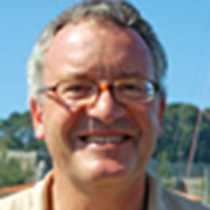La Rochelle, France
La Rochelle resonates in the history of European Protestantism for its heroic but unsuccessful siege against the forces of Cardinal Richelieu's government in the year 1627/1628. Only in the twentieth century did the Parisian authorities accede to the wishes of the townspeople for a public statue in commemoration of the man who led the besieged city, Mayor Jean Guiton, which now dominates the square outside the splendid sixteenth-century Hôtel de Ville. For Protestantism had taken root quickly in France and nowhere more so that amongst the prosperous merchants of this Atlantic seaport. Known as Huguenots, their dissent from the religious practices of the majority of their countrymen made them an object of suspicion and plunged France into a period of civil war – Catholic versus Protestant – that ran intermittently from 1562 to 1709. On August 24th 1572, after lulling the Huguenots into a false sense of security by an offer of freedom of worship made two years previously, the king ordered the massacre of thousands of Protestants in the French capital, an event immortalized as the St Bartholomew's Day Massacre. The massacre inevitably produced another bout of civil war, with the Protestant cause upheld by Henry of Navarre, a brilliant strategist who came to the throne as Henri IV. For reasons of state, he went on to become a Catholic – uttering the immortal words: Paris vaut une messe (Paris is worth a mass). But this was not an act of betrayal: within five years of coming to the throne he had granted the Protestants religious freedom by issuing the Edict of Nantes. In La Rochelle, he is still fondly remembered as "one of us."
The good times didn't last. In the reign of Louis XIII, the city of La Rochelle was besieged and in 1685 Louis XIV revoked the Edict of Nantes, driving hundreds of thousands of French Huguenots into exile. They went to the Protestant North – Great Britain, The Netherlands, Switzerland and the German states – or to the British colonies in America, notably to New York, Massachusetts and South Carolina. They took with them skills from which their adopted countries would soon benefit: the Courtauld family arriving in Britain with their expertise in textiles is just one example. French intellectuals were quick to see what a disaster religious strife and persecution had been for the country and throughout the eighteenth century men like Voltaire and Montesquieu argued the case for religious freedom. Their writings influenced both the American Constitution and the French Declaration of the Rights of Man as well as subsequent Declarations of Human Rights by the United Nations and the European Union. It was no surprise today, therefore, on our walk through the city, to see not only the French tricolor but also the European Union and United Nations flags flying in the gentle breeze above the Hôtel de Ville.
La Rochelle resonates in the history of European Protestantism for its heroic but unsuccessful siege against the forces of Cardinal Richelieu's government in the year 1627/1628. Only in the twentieth century did the Parisian authorities accede to the wishes of the townspeople for a public statue in commemoration of the man who led the besieged city, Mayor Jean Guiton, which now dominates the square outside the splendid sixteenth-century Hôtel de Ville. For Protestantism had taken root quickly in France and nowhere more so that amongst the prosperous merchants of this Atlantic seaport. Known as Huguenots, their dissent from the religious practices of the majority of their countrymen made them an object of suspicion and plunged France into a period of civil war – Catholic versus Protestant – that ran intermittently from 1562 to 1709. On August 24th 1572, after lulling the Huguenots into a false sense of security by an offer of freedom of worship made two years previously, the king ordered the massacre of thousands of Protestants in the French capital, an event immortalized as the St Bartholomew's Day Massacre. The massacre inevitably produced another bout of civil war, with the Protestant cause upheld by Henry of Navarre, a brilliant strategist who came to the throne as Henri IV. For reasons of state, he went on to become a Catholic – uttering the immortal words: Paris vaut une messe (Paris is worth a mass). But this was not an act of betrayal: within five years of coming to the throne he had granted the Protestants religious freedom by issuing the Edict of Nantes. In La Rochelle, he is still fondly remembered as "one of us."
The good times didn't last. In the reign of Louis XIII, the city of La Rochelle was besieged and in 1685 Louis XIV revoked the Edict of Nantes, driving hundreds of thousands of French Huguenots into exile. They went to the Protestant North – Great Britain, The Netherlands, Switzerland and the German states – or to the British colonies in America, notably to New York, Massachusetts and South Carolina. They took with them skills from which their adopted countries would soon benefit: the Courtauld family arriving in Britain with their expertise in textiles is just one example. French intellectuals were quick to see what a disaster religious strife and persecution had been for the country and throughout the eighteenth century men like Voltaire and Montesquieu argued the case for religious freedom. Their writings influenced both the American Constitution and the French Declaration of the Rights of Man as well as subsequent Declarations of Human Rights by the United Nations and the European Union. It was no surprise today, therefore, on our walk through the city, to see not only the French tricolor but also the European Union and United Nations flags flying in the gentle breeze above the Hôtel de Ville.




